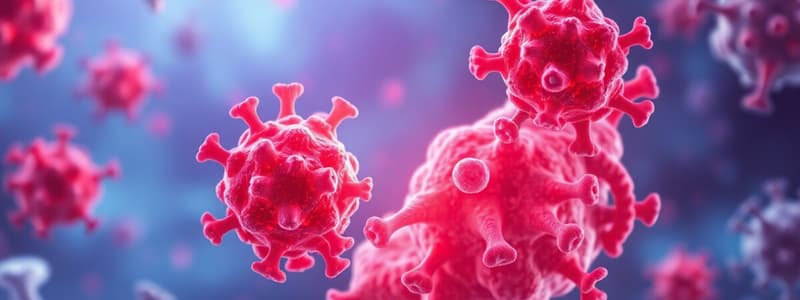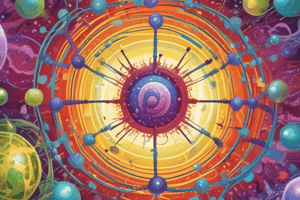Podcast
Questions and Answers
What is the primary role of dendritic cells in the immune response?
What is the primary role of dendritic cells in the immune response?
- To directly kill viral pathogens
- To bridge innate and adaptive immune responses (correct)
- To produce antibodies
- To phagocytize bacterial cells
Which immune cell type is specifically involved in recognizing MHC Class I molecules?
Which immune cell type is specifically involved in recognizing MHC Class I molecules?
- Neutrophils
- B cells
- Cytotoxic T cells (CD8+) (correct)
- T helper cells
What is the function of chemokines in the immune system?
What is the function of chemokines in the immune system?
- To phagocytize pathogens
- To activate T cells
- To attract leukocytes to sites of infection (correct)
- To produce antibodies
Which mechanism do complement proteins use to directly kill bacteria?
Which mechanism do complement proteins use to directly kill bacteria?
Which of the following components is contained within phagolysosomes?
Which of the following components is contained within phagolysosomes?
What is the primary function of neutrophils in the innate immune system?
What is the primary function of neutrophils in the innate immune system?
Which component is NOT a characteristic of the inflammatory response?
Which component is NOT a characteristic of the inflammatory response?
How are antibodies primarily produced in response to an invader?
How are antibodies primarily produced in response to an invader?
What is the role of MHC (Major Histocompatibility Complex) in the adaptive immune system?
What is the role of MHC (Major Histocompatibility Complex) in the adaptive immune system?
What is a distinguishing feature of humoral immunity compared to cellular immunity?
What is a distinguishing feature of humoral immunity compared to cellular immunity?
Which immune cell type is known for its ability to engulf pathogens through phagocytosis?
Which immune cell type is known for its ability to engulf pathogens through phagocytosis?
What triggers the release of granules from mast cells during inflammation?
What triggers the release of granules from mast cells during inflammation?
Which cell type directly recognizes MHC Class 1 on non-self cells?
Which cell type directly recognizes MHC Class 1 on non-self cells?
Flashcards
Granulocytes
Granulocytes
A type of white blood cell containing granules with antimicrobial proteins.
Neutrophils
Neutrophils
A type of granulocyte, the most common white blood cell (60%).
Dendritic Cells
Dendritic Cells
Immune cells that bridge innate and adaptive immunity by migrating to lymph nodes.
MHC Class I
MHC Class I
Signup and view all the flashcards
Chemokines
Chemokines
Signup and view all the flashcards
What is the first line of defense against infection?
What is the first line of defense against infection?
Signup and view all the flashcards
How does the innate immune system respond to infection?
How does the innate immune system respond to infection?
Signup and view all the flashcards
What is inflammation?
What is inflammation?
Signup and view all the flashcards
What is the role of MHC molecules?
What is the role of MHC molecules?
Signup and view all the flashcards
What are antibodies?
What are antibodies?
Signup and view all the flashcards
How are antibodies made?
How are antibodies made?
Signup and view all the flashcards
What is the function of T cells?
What is the function of T cells?
Signup and view all the flashcards
What is the difference between cellular and humoral immunity?
What is the difference between cellular and humoral immunity?
Signup and view all the flashcards
Study Notes
Immunology - Key Concepts
- Immune Processes: Different cell types adapt and enable immunity & nerve impulse generation.
- Cytokines: Transmit information between cells.
- Granulocytes: Contain granules with antimicrobial proteins; Neutrophils make up 60% of WBCs.
- Dendritic Cells: Bridge innate and adaptive immunity, migrating to lymph nodes.
- Interferons: Interfere with immune response, shutting down infected cells.
- Natural Killer (NK) Cells: Provide early protection against virally infected cells.
- Adaptive Immunity: Provides virus-specific cytotoxic T cells.
- Cytotoxic T Cells (CD8+): Recognize pathogen peptides on MHC Class I molecules.
- MHC Class I: Found on every nucleated cell.
- MHC Class II: Found on professional antigen-presenting cells (dendritic cells).
- Chemokines: Direct leukocyte migration; a type of cytokine that can diffuse across tissues.
- T Helper Cells: Recognize MHC class I.
- Cytotoxic T Cells: Recognize MHC class I.
- Complement: Directly lyses bacteria via membrane attack complex formation.
- Neutrophils: Granulocytes.
- Phagolysosomes: Contain reactive oxygen species.
Innate Immune System
- Passive Barriers: Structures ready to defend against infection (e.g., airway mucosa, urination).
- Innate Immune System Components: Various specialized cells and proteins, and inflammatory responses.
- Neutrophils: Most common WBC type, containing granules for pathogen digestion.
- Macrophages: Large cells, engulf pathogens via phagocytosis.
- Mast cells: Contain granules triggered by injury, initiating inflammation.
- Inflammation Features: Redness, pain, swelling (edema), heat.
- Vasodilation: Widened blood vessels for easier passage.
Adaptive Immune System
- Adaptive Features: Highly specific responses to antigens, and immune memory.
- B cells & T cells: Key Adaptive cells
- Roles of T helper cells: Activating B cells, triggering killer T cells
Immune Cells Involved in Inflammation & Immunity
- T-cells
- Lymphocytes
- Monocytes
- Mast cells
- Macrophages
Antibody Production
- Antigen presentation to B cells: B cells engulf, display on MHC Class 2, and activate.
- B cell activation: Clonal expansion of B cells created plasma cells which secrete antibodies.
- T cells: MHC Class 2 fits with different T cell-receptors, triggering B cell multiplication, activating macrophages, recognizing non-self cells using MHC Class 1.
Pathogen Types and Locations
- Viruses: Intracellular
- Bacteria: Intracellular or Extracellular
- Fungi: Extracellular
- Protozoa: Extracellular
- Parasites: Extracellular
Multiple Layered Immune System
- Anatomic Barriers: First line of defense (e.g., skin, mucus membranes).
- Microbial proteins: Innate immune components.
- Immune cells: Innate and adaptive components.
- Stages of immune response -Inflammatory system inducers> sensor cells> mediators> target tissues
Studying That Suits You
Use AI to generate personalized quizzes and flashcards to suit your learning preferences.




